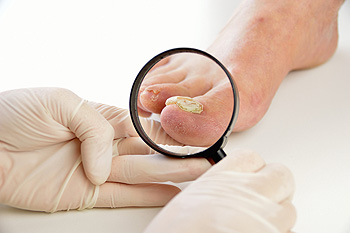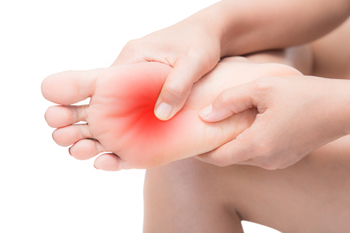
 When fungus gets under the toenail, it begins to feed on the keratin that makes up the nail. While an infected nail is easy to treat in the early stages, the infection becomes more and more difficult to manage as it grows. Common risk factors for developing a fungal nail infection may include trauma, poor hygiene, sweating, and walking barefoot in moist environments. Toenails that have been infected by a fungus will become brittle, crumble, and turn yellowish in color. Treatments for infected toenails can include topical medications, oral medications, and laser treatment. If you believe that you are afflicted with a toenail fungus, it is important that you consult with a podiatrist for proper care and treatment.
When fungus gets under the toenail, it begins to feed on the keratin that makes up the nail. While an infected nail is easy to treat in the early stages, the infection becomes more and more difficult to manage as it grows. Common risk factors for developing a fungal nail infection may include trauma, poor hygiene, sweating, and walking barefoot in moist environments. Toenails that have been infected by a fungus will become brittle, crumble, and turn yellowish in color. Treatments for infected toenails can include topical medications, oral medications, and laser treatment. If you believe that you are afflicted with a toenail fungus, it is important that you consult with a podiatrist for proper care and treatment.
For more information about treatment, contact one of our podiatrists of Grand Blanc Family Footcare. Our doctors can provide the care you need to keep you pain-free and on your feet.
Toenail Fungus Treatment
Toenail fungus is a condition that affects many people and can be especially hard to get rid of. Fortunately, there are several methods to go about treating and avoiding it.
Antifungals & Deterrence
Oral antifungal medicine has been shown to be effective in many cases. It is important to consult with a podiatrist to determine the proper regiment for you, or potentially explore other options.
Applying foot powder on the feet and shoes helps keep the feet free of moisture and sweat.
Sandals or open toed shoes – Wearing these will allow air movement and help keep feet dry. They also expose your feet to light, which fungus cannot tolerate. Socks with moisture wicking material also help as well.
If you have any questions please feel free to contact our office located in Grand Blanc, MI . We offer the newest diagnostic tools and technology to treat your foot and ankle needs.
 Injury to the foot and ankle can be common among runners. Fortunately, there are steps you can take to help prevent injuries. It is said when you first start running, build up your training regimen slowly, increasing the amount of time and distance that you run at a very gradual pace. Allow your body and feet adequate time to adjust, as well as rest and heal. It is also important to develop a good running technique. This can be accomplished through running lessons, where an instructor can teach you about proper foot placement and other techniques to ensure that you stay safe while you run. Finally, make sure that you wear supportive, properly-fitted running shoes when you exercise. For more advice on preventing running injuries, consult with a podiatrist today.
Injury to the foot and ankle can be common among runners. Fortunately, there are steps you can take to help prevent injuries. It is said when you first start running, build up your training regimen slowly, increasing the amount of time and distance that you run at a very gradual pace. Allow your body and feet adequate time to adjust, as well as rest and heal. It is also important to develop a good running technique. This can be accomplished through running lessons, where an instructor can teach you about proper foot placement and other techniques to ensure that you stay safe while you run. Finally, make sure that you wear supportive, properly-fitted running shoes when you exercise. For more advice on preventing running injuries, consult with a podiatrist today.
Exercising your feet regularly with the proper foot wear is a great way to prevent injuries. If you have any concerns about your feet, contact one of our podiatrists of Grand Blanc Family Footcare. Our doctors will treat your foot and ankle needs.
How to Prevent Running Injuries
Many common running injuries are caused by overuse and overtraining. When the back of the kneecap starts wearing out and starts causing pain in your knee, this is commonly referred to as runner’s knee. Runner’s knee is a decrease in strength in your quadriceps and can occur if you’re not wearing properly fitted or supporting shoes. To prevent runner’s knee, focusing on hip strengthening is a good idea, as well as strengthening your quads to keep the kneecaps aligned.
What Are Some Causes of Running Injuries?
- One cause of a common running injury is called iliotibial band syndrome.
- Plantar fasciitis is also another common injury.
- Stress fractures can occur from overtraining, lack of calcium, or even your running style.
Best Ways to Prevent Running Injuries
- Wear footwear that fits properly and suits your running needs.
- Running shoes are the only protective gear that runners have to safeguard them from injury.
- Make a training schedule. Adding strengthening exercises as well as regular stretching can help keep you strong and limber and can lessen the possibility of injuries.
- Stretching keeps muscles limber; this will help you gain better flexibility.
If you have any questions please feel free to contact our office located in Grand Blanc, MI . We offer the newest diagnostic and treatment technologies for all your foot and ankle needs.
 The foot has 26 bones, 33 joints, and a web of 126 muscles, ligaments and nerves. This complexity of the foot allows it to support weight, absorb shock and maintain the body’s balance. Because of all that the foot does, any discomfort in the foot should be monitored. Causes of foot pain in the toes include ingrown toenails, bunions, Morton’s neuroma and hammertoe. Pain in the back of the foot can be caused by issues such as plantar fasciitis, heel spurs, and Achilles tendonitis. Issues such as a stress fracture or sesamoiditis can be felt in the forefoot. Overall, there are a variety of issues that can cause pain in the foot, and it is important to consult with a podiatrist for proper diagnosis and treatment of the issue.
The foot has 26 bones, 33 joints, and a web of 126 muscles, ligaments and nerves. This complexity of the foot allows it to support weight, absorb shock and maintain the body’s balance. Because of all that the foot does, any discomfort in the foot should be monitored. Causes of foot pain in the toes include ingrown toenails, bunions, Morton’s neuroma and hammertoe. Pain in the back of the foot can be caused by issues such as plantar fasciitis, heel spurs, and Achilles tendonitis. Issues such as a stress fracture or sesamoiditis can be felt in the forefoot. Overall, there are a variety of issues that can cause pain in the foot, and it is important to consult with a podiatrist for proper diagnosis and treatment of the issue.
Foot Pain
Foot pain can be extremely painful and debilitating. If you have a foot pain, consult with one of our podiatrists from Grand Blanc Family Footcare. Our doctors will assess your condition and provide you with quality foot and ankle treatment.
Causes
Foot pain is a very broad condition that could be caused by one or more ailments. The most common include:
Diagnosis
To figure out the cause of foot pain, podiatrists utilize several different methods. This can range from simple visual inspections and sensation tests to X-rays and MRI scans. Prior medical history, family medical history, and any recent physical traumatic events will all be taken into consideration for a proper diagnosis.
Treatment
Treatment depends upon the cause of the foot pain. Whether it is resting, staying off the foot, or having surgery; podiatrists have a number of treatment options available for foot pain.
If you have any questions, please feel free to contact our office located in Grand Blanc, MI . We offer the newest diagnostic and treatment technologies for all your foot care needs.
 There are many changes women endure during their pregnancy. The feet are generally affected, and swelling is a common ailment. This may be a result of various reasons, which can include an increase in leg pressure from the growing fetus, the development of flat feet, and the arch and ankle may become unstable. Additionally, hormonal changes may be responsible for hot and burning sensations that can occur in the feet. Many pregnant women find relief when their feet are frequently elevated, and it is beneficial to reduce sodium intake. If you would like more information about remedies that can help your feet to feel better during pregnancy, is it suggested that you consult with a podiatrist.
There are many changes women endure during their pregnancy. The feet are generally affected, and swelling is a common ailment. This may be a result of various reasons, which can include an increase in leg pressure from the growing fetus, the development of flat feet, and the arch and ankle may become unstable. Additionally, hormonal changes may be responsible for hot and burning sensations that can occur in the feet. Many pregnant women find relief when their feet are frequently elevated, and it is beneficial to reduce sodium intake. If you would like more information about remedies that can help your feet to feel better during pregnancy, is it suggested that you consult with a podiatrist.
Pregnant women with swollen feet can be treated with a variety of different methods that are readily available. For more information about other cures for swollen feet during pregnancy, consult with one of our podiatrists from Grand Blanc Family Footcare. Our doctors will attend to all of your foot and ankle needs.
What Foot Problems Can Arise During Pregnancy?
One problem that can occur is overpronation, which occurs when the arch of the foot flattens and tends to roll inward. This can cause pain and discomfort in your heels while you’re walking or even just standing up, trying to support your baby.
Another problem is edema, or swelling in the extremities. This often affects the feet during pregnancy but tends to occur in the later stages.
How Can I Keep My Feet Healthy During Pregnancy?
If you have any questions please feel free to contact our office located in Grand Blanc, MI . We offer the newest diagnostic and treatment technologies for all your foot and ankle needs.